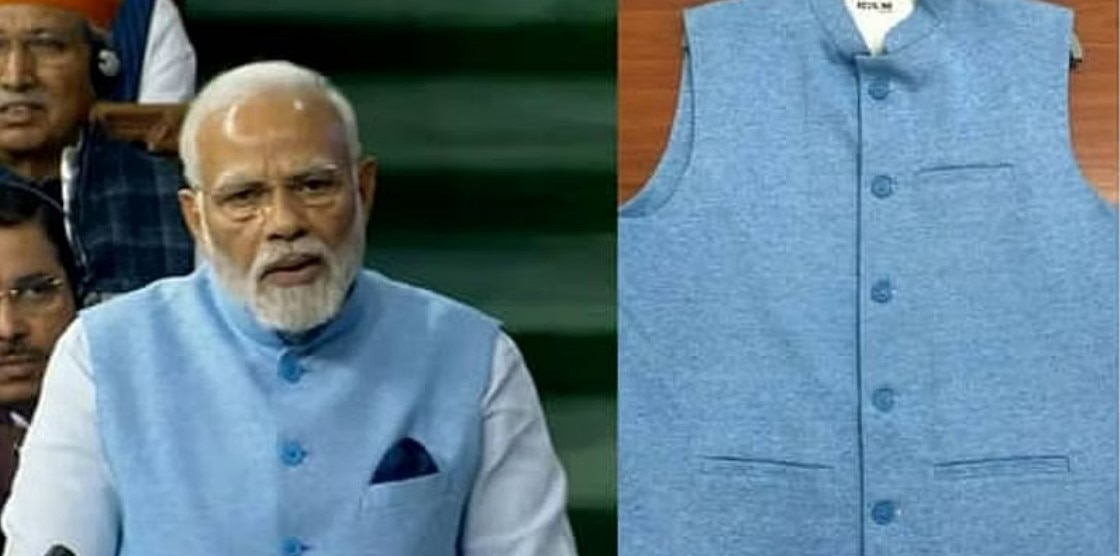K Sankar used to work abroad and after spending a good three decades outside India, he returned to India with a vision to combat the menace of plastic.
New Delhi: K Sankar and his son, Senthil Sankar, the father-son duo behind the Tamil Nadu-based company, Shree Renga Polymers and Ecoline is on a mission to revolutionise the concept of fashion by repurposing discarded PET bottles and transforming them into stylish, eco-friendly garments.
EcoLine is at the forefront of the sustainable fashion movement. By recycling PET bottles, they produce a range of fashionable clothing items, including jackets, T-shirts, blazers, and bottoms. Astonishingly, it takes just eight PET bottles to make a T-shirt, twenty to make a jacket, and thirty to make a blazer.
Read More: Gold Latest Rate In India On June 20: Check 22 And 24 Carat Price In Your City Here
The company came into the spotlight after Prime Minister Narendra Modi recently wore a jacket made by EcoLine Clothing.
PM Modi had wore the company’s blue Sadri jacket to Parliament in February this year. He also wore Ecoline jackets again at the G7 Summit in Hiroshima, Japan. Recently, EcoLine also presented a unique Mandarin Colour jacket made from recycled PET Bottles to Uttar Pradesh Chief Minister Yogi Adityanath. The Jacket was presented to CM Yogi Adityanath by Dr. Arun Kumar Saxena, Minister of State (Independent Charge), Environment, Forest and Climate Change, Govt of Uttar Pradesh.
“You see, the textile value chain is very complex. We had a vision of converting a dirty plastic bottle into a pretty garment, and we did it and that’s what fascinated even the Prime Minister. Never in our wildest dreams did we have thought that PM Modi would be wearing EcoLine’s clothing product and I feel more proud that with this endorsement, Karur, a place hardly anyone knows in India became the spotlight,” Senthil was quoted as saying by yourstory.com.

About K Sankar and Senthil Sankar
K Sankar used to work abroad and after spending a good three decades outside India, he returned to India with a vision to combat the menace of plastic.
In 2008, K Sankar founded Shree Renga Polymers.
The company is today a frontrunner in pet bottle recycling and sustainable textiles in India and has an annual turnover of Rs 100 crore.
Located in the tranquil city of Karur known for its home textile industries, the company uses German technology to power its production lines.
K Sankar is an IIT-ian with global work experience across different countries and extensive exposure to C-level work experience with MNCs. He was given the “Best Entrepreneur of the Year” Award 2018 from the Government of Tamil Nadu and also served as the Chairman of CII, Karur, and also as the Chairman of Native Lead, Karur.
His son Senthil Sankar is the next-gen entrepreneur. Senthil Sankar pursued Mechanical Engineering at Vellore Institute of Technology and did the executive education program at the Indian Institute of Management, Ahmedabad.
He then worked with TCS for three years before joining his father’s business. He is also an Angel Investor for many startups.
Read More: China Cuts Lending Rates To Revive Consumption, Asian Shares Fall
The challenges
The sustainability wasn’t the main problem Sankar faced at that them but collecting waste from different regions of Tamil Nadu was the actual struggle for Sankar. Additionally, he had to endure judgment as society didn’t approve of an IITian collecting waste from fields.

At this time Senthil was still in school. Recalling the time he says that he would see his father doing all that work but the business never kicked off.
“My mother is an IITian too and she was the bread earner and supported the home to make ends meet,” Senthil told the publication.
As Senthil went on to complete his engineering degree, Sankar wanted him to bag a comfortable job abroad. However, just like his father, Senthil wanted to do something of his ownIn 2015, Senthil joined his father’s struggling business.
According to Senthil, they didn’t have collaterals that would count up to get loans and no investor wanted to invest in a business that didn’t have a stable revenue model. “We were in a death valley,” Senthil says.
Read More: Chinese President Xi Meets US State Secretary Blinken; Says Agreement Reached On ‘Some Issues’
By 2019, Shree Renga Polymers had entered making yarns and fibres supplying to various industries including automotives, textile, technical textile, and many more and this is how after so many speed breakers, they finally kicked off.
They also believed that the consumer mindset was also one of the biggest challenges which the company went through. Senthil saidthat customers are still sceptical wearing clothes made out of plastic.
Senthil expects that by 2030, EcoLine Clothing would convert all the fibres the company is making into garments. “Seven years down the line, we will be an altogether different company,” he signs off.





































